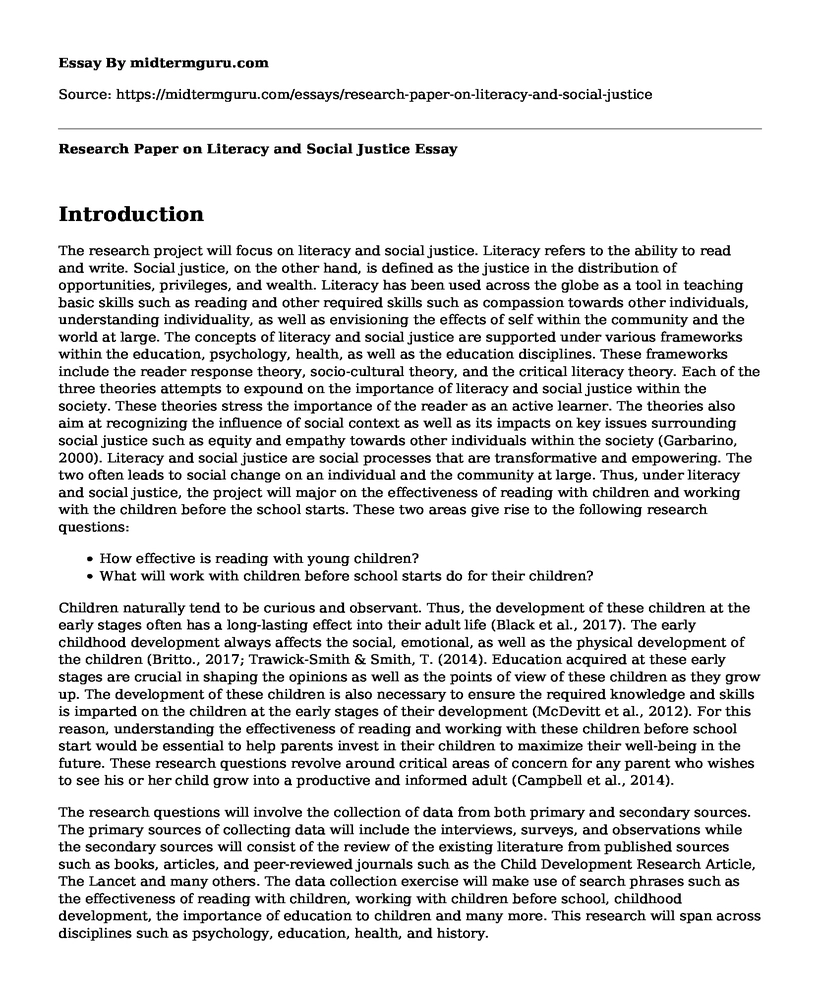Introduction
The research project will focus on literacy and social justice. Literacy refers to the ability to read and write. Social justice, on the other hand, is defined as the justice in the distribution of opportunities, privileges, and wealth. Literacy has been used across the globe as a tool in teaching basic skills such as reading and other required skills such as compassion towards other individuals, understanding individuality, as well as envisioning the effects of self within the community and the world at large. The concepts of literacy and social justice are supported under various frameworks within the education, psychology, health, as well as the education disciplines. These frameworks include the reader response theory, socio-cultural theory, and the critical literacy theory. Each of the three theories attempts to expound on the importance of literacy and social justice within the society. These theories stress the importance of the reader as an active learner. The theories also aim at recognizing the influence of social context as well as its impacts on key issues surrounding social justice such as equity and empathy towards other individuals within the society (Garbarino, 2000). Literacy and social justice are social processes that are transformative and empowering. The two often leads to social change on an individual and the community at large. Thus, under literacy and social justice, the project will major on the effectiveness of reading with children and working with the children before the school starts. These two areas give rise to the following research questions:
- How effective is reading with young children?
- What will work with children before school starts do for their children?
Children naturally tend to be curious and observant. Thus, the development of these children at the early stages often has a long-lasting effect into their adult life (Black et al., 2017). The early childhood development always affects the social, emotional, as well as the physical development of the children (Britto., 2017; Trawick-Smith & Smith, T. (2014). Education acquired at these early stages are crucial in shaping the opinions as well as the points of view of these children as they grow up. The development of these children is also necessary to ensure the required knowledge and skills is imparted on the children at the early stages of their development (McDevitt et al., 2012). For this reason, understanding the effectiveness of reading and working with these children before school start would be essential to help parents invest in their children to maximize their well-being in the future. These research questions revolve around critical areas of concern for any parent who wishes to see his or her child grow into a productive and informed adult (Campbell et al., 2014).
The research questions will involve the collection of data from both primary and secondary sources. The primary sources of collecting data will include the interviews, surveys, and observations while the secondary sources will consist of the review of the existing literature from published sources such as books, articles, and peer-reviewed journals such as the Child Development Research Article, The Lancet and many others. The data collection exercise will make use of search phrases such as the effectiveness of reading with children, working with children before school, childhood development, the importance of education to children and many more. This research will span across disciplines such as psychology, education, health, and history.
References
Black, M. M., Walker, S. P., Fernald, L. C., Andersen, C. T., DiGirolamo, A. M., Lu, C., ... & Devercelli, A. E. (2017). Early childhood development is coming of age: science through the life course. The Lancet, 389(10064), 77-90.
Britto, P. R., Lye, S. J., Proulx, K., Yousafzai, A. K., Matthews, S. G., Vaivada, T., ... & MacMillan, H. (2017). Nurturing care: promoting early childhood development. The Lancet, 389(10064), 91-102.
Campbell, F.A., Conti, G., Heckman, J.J., Moon, S.H., Pinto, R.B., Pungello, E.P., & Pan, Y. (2014). Early Childhood Investments Substantially Boost Adult Health. Science, 343, 1478-1485.
Garbarino, J. (2000). Parenting and child development in" nontraditional" families.
McDevitt, T. M., Ormrod, J. E., Cupit, G., Chandler, M., & Aloa, V. (2012). Child development and education. Pearson Higher Education AU.
Trawick-Smith, J. W., & Smith, T. (2014). Early childhood development: A multicultural perspective. Upper Saddle River, NJ: Pearson.
Cite this page
Research Paper on Literacy and Social Justice. (2022, Aug 18). Retrieved from https://midtermguru.com/essays/research-paper-on-literacy-and-social-justice
If you are the original author of this essay and no longer wish to have it published on the midtermguru.com website, please click below to request its removal:
- Introduction of ASIC v Hellicar Caselaw - Paper Example
- Women's Rights, Animal Rights and Euthanasia Paper Example
- Essay Sample on Supreme Court Decision about Native Americans
- Paper Example on Municipal Courts Slam the Poor Hardest
- Essay Sample on Gender-Specific Programs in Juvenile Justice System
- Essay Sample on Cyberstalking
- Tackling Crime: How Cultural Changes Shape Legal Landscape - Essay Sample







